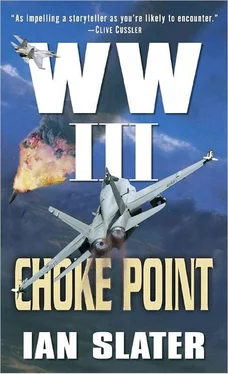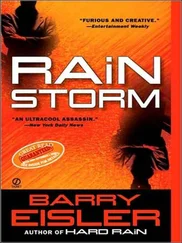“Good!” he said aloud.
“What?” said the “ice cream” man, his shadow cutting across the winch drum. “Oh yeah. Amazing stuff, eh?”
“Get outta my light!”
Suddenly, there was a tremendous splash astern, foaming seawater cascading down on the work party, swirling and running out about their feet through the scuppers with furious speed. Two men were sprawled on the deck, cursing and trying to get their wind, when Frank, grasping Petrel ’s starboard rail, shouted, “Bring ’im in slowly.” Albinski’s neoprene suit looked bigger than it should have been, his helmet still obscured by an errant swath of kelp that took on a bright cherry color in the arc light.
“Mother of God!” said the bosun, his tone immediately casting a pall over the deck crew.
Frank was helping up one of the men who had been downed in the splash caused by the enormous ball of kelp that had suddenly given way under the pike’s probing and plunged back into the sea. “In easy,” he said in a tone as gentle as the soft rain that continued to fall, its shadows slicing the deck lamp’s light like a black snow.
The cherry-colored helmet contained all that remained of Rafe Albinski. The tremendous sea pressures, set upon him when his one-way nonreturn valve failed to shut, had crushed his body, expelling the ninety-eight percent that was water, pulverizing the remaining two percent of bone, skin, and organs into a paste that was forced by the indifferent laws of physics up the ruptured tube that had been his dry suit into his helmet. What had been his dry suit was now an obscenely bloated Michelin-tire-man figure that, having expanded as it rose to the surface, was disgustingly urinating from a hundred different pin-sized holes.
Two of the deck party had dropped their pikes and run back amidships, being sick over the side, for which Frank Hall would dock them five hundred dollars each. If he’d still been in the Navy, he would have insisted on formally charging them. He knew that ex-SEAL Albinski would have understood his fellow SEAL’s action. By deserting the afterdeck, albeit in shock, they had left the work party short-handed with a fellow SEAL’s umbilical cord still ascending, when every man in the work party was needed in order to tear off block-choking kelp that Frank fully expected to see wrapped about Dixon’s line.
“In sight!” called out the bosun.
“Shit,” said the ice cream man. “This bastard’s bigger’n the other one.” Fortunately he meant the kelp entanglement and not Dixon’s dry suit which, once the kelp was cut off, was revealed, unlike Albinski’s, to be as form-fitting as it should have been. Even so, with seawater pouring off it, it wasn’t certain whether it was puncture-free. It was only when they saw Dixon’s eyes, exhausted-looking yet obviously cognizant of what was going on, that they knew his nonreturn valve had continued to function properly.
As Frank disengaged Dixon’s fiberglass helmet from its O-ring neck assembly, Dixon was shivering so badly he couldn’t speak, his lips purple. But Frank knew the young SEAL desperately wanted to say something: to ask whether his diving buddy was okay. And if not, why?
When the machine-chattering newsroom at CNN headquarters in Atlanta received the report from its Kabul correspondent of a bomb having exploded northwest of Jinhe, no one had any idea where it was. Besides, bombings by terrorists, separatists, freedom fighters, whatever they called themselves, were a dime a dozen, and unless an incident seemed to have any direct bearing on the U.S.’s wider world war against terrorism, it simply didn’t make the cut for the news. But a professional sifter in the newsroom was paid to keep tabs on the location of all place names coming in on the media feed, in the event that some out-of-the-way hole in the wall suddenly became prominent. The sifter, clacking away on his computer, heard one of the anchorwoman’s assistants add, “Kabul guy reports Chinese troop movement along the border.”
“What border?”
The Kabul correspondent spelled it for her; all these “Stans” that sounded alike in central Asia had never meant anything to the American public. Before the wars on terrorism in Afghanistan and Iraq, such countries were ignored by the world in general, relatively few people even knowing they were breakaway republics from the old Soviet Union.
“Along the border with Kaz-akh-stan,” said the sifter.
“Here it is,” put in another assistant. “Jinhe — some burg ’bout eighty to ninety miles from the Chinese border with Kazakhstan. Looks like it’s on the only rail link between the two countries.”
“U.S. have anything near it?”
The sifter enlarged the computer map. Jinhe was in Kyrgyzstan, immediately below southeastern Kazakhstan. “Apparently we have a big air base there. Let’s see.” He tapped the mouse. “At someplace called Manas. Three and a half thousand of our guys.”
“Personnel,” the anchor told the sifter.
“Yeah, right. Base has been there since 2002—puts us in range of Tajikistan, Afghanistan, Iran…. Man, who’d believe it? Most of these Stans used to belong to the Ruskies. Two hundred and thirty million, more than one and a half times the population of Russia. Now we’ve got a base there — fighters, transporters, and tanker planes.”
“Hey,” added the anchor during a commercial break. “Russia is now a member of NATO. Chew on that.”
“World war against terrorism,” said the sifter, by way of explanation. “Politics makes strange bedfellows.”
“The enemy of my enemy is my friend,” said someone else.
“All right,” joshed the anchor. “Enough with the proverbs. How big was this bomb attack in this Jinhe?” He glanced at his recessed computer screen.
“Our guy in Kabul,” replied the sifter, “says it blew apart the rail tracks for a mile or so.”
“Any American citizens killed or injured?” It was the news producer in the booth.
“Don’t know yet,” said the anchor, shuffling his papers, ready to move on to the next item, but not before hearing a staff member voicing his curiosity about the explosion being so large as to have taken out a mile or so of track.
Within a half hour of the predawn bomb attack on the rail link northwest of Jinhe, between China’s far northwestern province and oil-rich Kazakhstan, two Chinese Group Armies, 112,000 men — a fraction of the PLA’s three million — crossed the one-thousand-mile-long border on a three-mile front northeast of Jinhe, each army of 56,000 men with their own air engineering and artillery support. In Urumqi, Xinjiang’s drab smokestack capital of 1.5 million, 270 miles east of where the two armies were crossing into Kazakhstan, another bomb exploded in a mailbox outside the Holiday Inn, killing three people and injuring a dozen laborers on their way to work early in the morning. This bomb, authorities suspected, was probably meant to explode later, in the morning rush hour. As sirens wailed through the city, the Gong An Bu began rounding up the list of usual suspects, Muslim separatists from among the Muslim Urghurs, who made up 7.3 million of the province’s seventeen million inhabitants and had always considered the Han Chinese to be invaders, since as recently as 1955 over ninety percent of Xinjiang’s inhabitants were non-Chinese. But now over half the population were Chinese, sent westward in droves by Beijing, who wanted to secure the province, in part to use the salt lake Lop Nur, in the vast area of Xinjiang’s Turpan Basin, for further nuclear testing.
The two Group Armies dispatched from the Tacheng subdistrict in Lanzhou, one of China’s seven military regions, met only sporadic resistance in the form of AK-47-toting Muslim Urghurs. The latter used Red Arrow antitank guided missiles, which, despite multiple firings whose backblasts and burned solid-propellant blossomed and crisscrossed in the dusty air, took out only eight of the PLA’s upgunned T-69s. These Russian-made PLA tanks, with their laser-sighted 125mm cannons, decimated forty-two of the Muslim rebels’ old Russian 100mm T-55s, whose three-rounds-a-minute and thousand-meter range could not stand up to the bigger bore, six-rounds-a-minute T-69s. And this despite the fact that many of the Kazakhstanis’ old Soviet T-55s had been equipped with reactive armor. The terrorists and nationalists in the Kazakhstani forces had placed high hopes in the reactive armor, whose explosive slabs would detonate when hit by a PLA’s T-69 armor-piercing discarding sabot round. But inferior manufacture of the reactive armor meant that it failed to stop the APDS’s ten-pound, foot-long dart from penetrating the Kazakhstanis’ T-55.
Читать дальше












